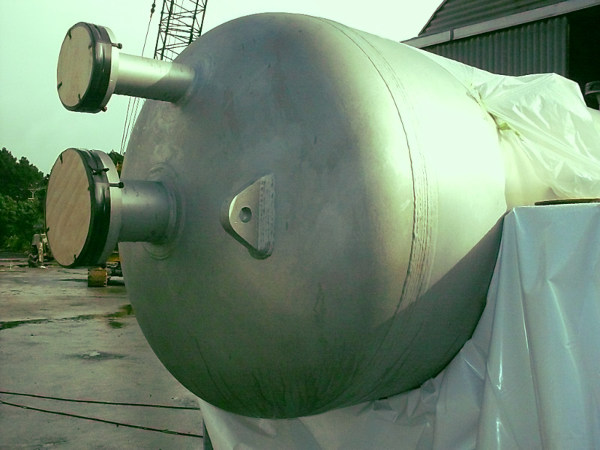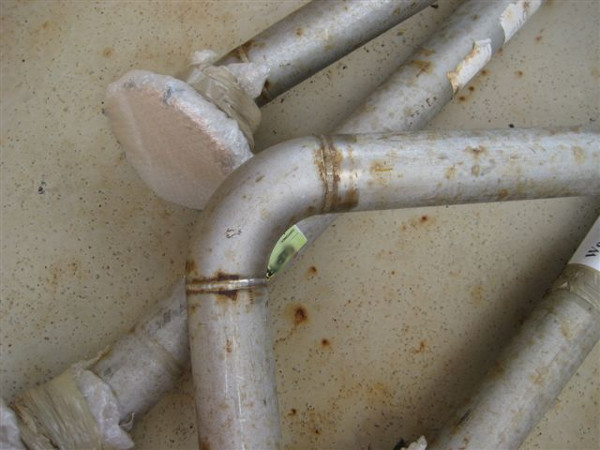WelderDestiny › Welder Career Progression › Welding Inspector Jobs
Welding Inspector Jobs
Moving into welding inspector jobs is one of the most common career progressions for Welders that are attracted to the higher knowledge side of welding. Depending on where in the world you are situated, the process of becoming a welding inspector will be a little different, but the globalization of engineering has introduced a couple of internationally recognized qualifications and certifications that qualifies you for a wide range of welding inspector jobs. The process is now simpler than in the past.
The WelderDestiny Compass: Weekly e-zine Subscription
You can take a look at "The WelderDestiny Compass" back-issues by clicking here.
The Job of a Welding Inspector
In
short, the role of the welding inspector is to make sure that the design
requirements for the weldment has been achieved. As such, it is considered a
Quality Control (QC) function. The welding inspector needs to know what the
requirements are, and then s/he needs to know if those requirements are being
met.
 Duplex Stainless Steel Pressure Vessel For High Pressure Application in the Off-Shore Gas Industry
Duplex Stainless Steel Pressure Vessel For High Pressure Application in the Off-Shore Gas IndustryThis
means that the welding inspector needs to have the knowledge of what the requirements
are in the first place, and then how to make sure that those requirements have
been met. The central knowledge base for welding inspector jobs are therefore:
- Knowledge of how to use and interpret the relevant welding codes. (e.g. ASME IX; AWS D1.1 etc.)
- Knowledge of the general requirements within the welding codes.
- Knowledge of quality system requirements and documentation.
- Knowledge of welding parameters and equipment.
- Knowledge of some basic welding metallurgy.
- Knowledge of how to measure the different weld quality requirements using specialized weld gauges and the like.
- Basic knowledge of Non Destructive Testing (NDT) requirements and capabilities.
While
the knowledge base is important to qualify for welding inspector jobs, just as important is
having the right personality for the job. While the welding inspector will need
to have a pragmatic approach to inspection, paying heed to the risks associated
with the particular component, s/he also needs to be able to stand their ground
when challenged regarding the calls made. The pressure placed on welding
inspectors by production personnel when a Does Not Comply (DNC) call is made
can be very significant. If you experience stress when having to standing up to
strong willed people, this may not be the job for you. If this does not phase
you, then this aspect of the welding inspector job should not cause you undue stress.
The Route to Welding Inspector Jobs are Qualifications
Traditionally
most of the developed economies had their own welding societies or associations
that got involved with the certification of welding personnel such as those for welding
inspector jobs. Due to the globalization of industry, there has been a steady move
towards more internationally recognized qualifications and certifications for welding inspector jobs.
Within
the Americas, the most widely used qualifications and most recognized
certifications for welding inspector jobs are those given through the American Welding Society. (AWS)
Within Europe the European Welding Federation (EWF) was formed to make welding
standards and certifications more recognized across national boundaries within
Europe. This is not to imply that
individual countries do not still operate their own schemes. A typical example
being CSWIP in the UK.
Another
organization that is taking a leading role globally in the certification of
personnel for welding inspector jobs is the International Institute of Welding. (IIW) The
International Institute of Welding is actually quite an old organization, but
its influence on the certification side of things is actually only quite
recent.
The
current situation is that most of the mainstream welding inspector
certifications are recognized in most parts of the world. By
"mainstream" I mean:
- AWS certifications
- EWF certifications
- IIW certifications
- CSWIP certifications
The
statement above is rather generalized, therefore it is best for you to make
sure which qualifications are recognized in the jurisdiction that you want to
work in. If you want to work internationally, then basically certifications
from any of the organizations listed above would qualify you for welding inspector jobs.
Personally
I would recommend the IIW qualifications if you want to work around Europe;
Africa and the Asia Pacific region. Many countries' national welding
associations or societies are aligned with the IIW, so it is usually relatively
easy to get to the necessary training courses to qualify for the registration
process. Again, confirm this with your country's welding body.
Also
keep in mind what flexibility you need for international recognition, given
your career plans. The way that many countries work is that they give you their
own certification, but their training programs are structured in such a way
that you can just do an additional exam to attain the IIW qualification as
well. This is well worth doing if that option is available to you, irrespective
of your current plans. Given the fast changing world, your plans may also
change rather unexpectedly.
 Corrosion on Unused Stainless Steel Pipe Spools Due to Surface Contamination During Fabrication
Corrosion on Unused Stainless Steel Pipe Spools Due to Surface Contamination During FabricationInspection Niches, Industries and Codes
As
is the case with being a Welder, there are many different industries within
which one can become a welding inspector. Examples being: process plant equipment;
pipeline; structures; aerospace; nuclear etc. While the basics associated with
being a welding inspector does not change significantly, the background
knowledge with regards the relevant welding codes will be quite different
between different industry segments.
When
you undergo your welding inspector training, there will typically be two or
three main codes that are dealt with. These will vary, depending on your
particular location and the organization through whom you undergo the
certification. Please note that it is not possible to become an expert in all
welding codes. There are way too many.
If
you are currently a Welder and you want to start gaining exposure to welding
codes so that you can prepare yourself for a life as a welding inspector, then
I recommend you focus on the following codes:
- ASME IX: This is geared to the welding of pressurized equipment such as piping and pressure vessels. – American based, but widely used internationally
- AWS D1.1: This is geared toward structural steelwork. – American based, but widely used internationally.
- API 1104: This is geared towards pipeline welding. – American based. Use relatively widely, although pipeline codes do tend to have a more regional bias. Many of the more local pipeline welding codes are loosely based on API 1104, so a good basis to have.
- ISO 15614-1: This is for the specification and qualification of welding procedures for arc and gas welding of steel and nickel alloys. It is used internationally, but the main use is in Europe.
While
the codes above are good starting points, there are numerous different codes,
standards and specifications that the welding inspector will need to get an
understanding of. These standards deal with subjects as diverse as welding
consumables, base materials, destructive and non-destructive testing methods,
quality management systems and the like. Understand that no welding inspector
starts off his/her career knowing all the relevant standards. You get to know
the base codes, and then you pretty much get to know the others through “on the
job” training over the years. The particular standards and codes being
dependent on your specific industry. The wider exposure you get to codes and
standards, the better a welding inspector you will be.
There
are many misconceptions about why the different codes have the requirements
that they do have, therefore it is important to find somebody that is well
informed to explain them to you, if you are uncertain.
Quality Systems Knowledge
Central
to the work of the welding inspector is the quality assurance and control
function. This is not only based on technical welding knowledge, but also
quality systems knowledge. Within this part of your work you will get to deal a
lot with quality management system standards such as the ISO 9000 series of standards,
and also the ISO 3834 series of standards. A basic understanding of these
standards are very advantageous to the welding inspector.
Quality
Assurance (QA) and Quality Control (QC) are largely driven by documented
systems and rely on documents and records to have traceability and an auditable
system. All of this will be central to your job as welding inspector. If you
are overly daunted by paperwork, then you may not enjoy the life of a welding
inspector.
Many
of the QA/QC systems are computerized in many companies, therefore you also
need to be comfortable working with computers.
WelderDestiny › Welder Career Progression › Welding Inspector Jobs
The WelderDestiny Compass: Weekly e-zine Subscription
You can take a look at "The WelderDestiny Compass" back-issues by clicking here.